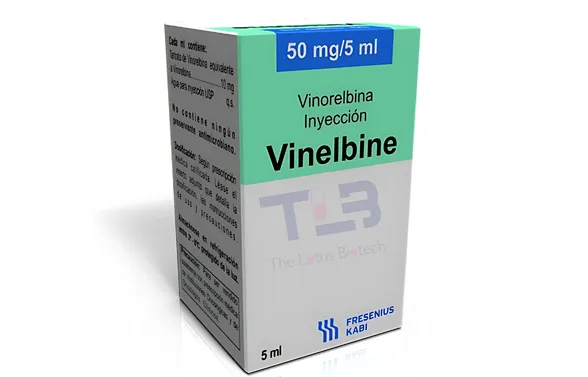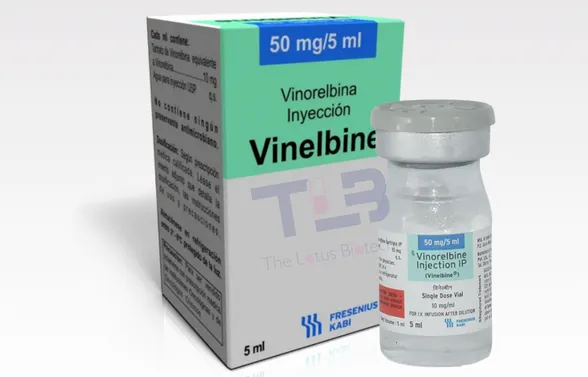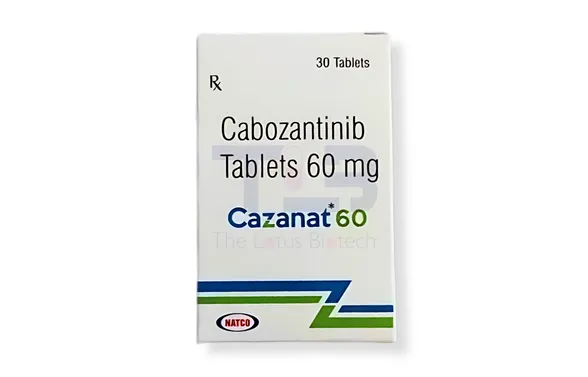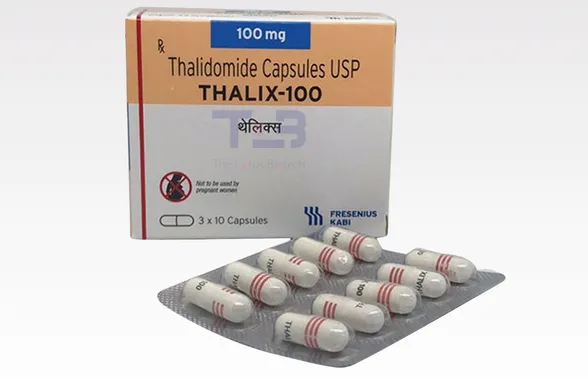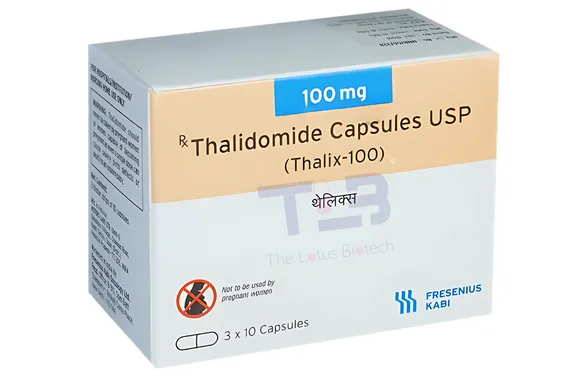Description
Complete Handbook on Vinelbine Vinorelbine 50 mg Injection: Usage and Insight
| Medicine | Vinelbine 50 mg Injection |
| Marketed By | Fresenius Kabi |
| Active Ingredient | Vinorelbine 50 mg |
| Storage | Do not freeze; store in a refrigerator (2–8°C). |
| Consume Type | Intravenous injection |
Vinelbine Vinorelbine 50 mg Injection – Introduction
Vinelbine 50 mg Injection is an anti-cancer chemotherapy medicine that contains Vinorelbine. This injection is used to treat cancers like breast cancer, non-small cell lung cancer (NSCLC), and cancer of the outer covering of the lung (mesothelioma).
How Vinelbine Vinorelbine 50 mg Injection Works: A Closer Look
Vinelbine 50 mg Injection utilizes Vinorelbine 50 mg, an anti-microtubule agent that inhibits division in tumor/cancer cells, ultimately causing their death. This injection prevents the growth and spread of cancer by disrupting cell division processes critical to their survival. By hampering the ability of cancerous cells to divide, Vinelbine facilitates their eventual destruction, offering a therapeutic approach to combating cancer progression.
Vinelbine Vinorelbine 50 mg Injection Use
- Advanced breast cancer
- Non-small cell lung cancer (NSCLC)
- Mesothelioma (cancer of the outer covering of the lung)
Vinelbine Vinorelbine 50 mg Injection– The Benefits
Advanced Breast Cancer
Vinelbine 50 mg Injection helps treat breast cancer, either on its alone or in combination with other therapies like chemotherapy. By preventing the growth and proliferation of cancer cells, it reduces the signs of breast cancer, including abnormalities in the breast.
Mesothelioma
Vinelbine 50 mg Injection is used for the treatment of Mesothelioma (Cancer of the outer covering of the lung). It is used to prevent and stop the further spread and development of the cancer.
Non-Small Cell Lung Cancer (NSCLC)
Vinelbine 50 mg Injection addresses Non-Small Cell Lung Cancer (NSCLC) and can be used either on its own or in conjunction with other drugs. Because of its known toxicity and potency, it must be thoroughly discussed with a healthcare professional, along with its advantages and disadvantages.
Vinelbine Vinorelbine 50 mg Injection – A Usage Guide
One should only get this medicine administered only by an expert medical professional. Do not try to self-administer this med.
Vinelbine Vinorelbine 50 mg Injection – Side Effects
Most side effects go away and do not need to be treated once your body adjusts to the medication. If they continue, or if you are concerned, see your physician.
Common Side Effects
- Decreased appetite
- Dizziness
- Fever
- Headache
- Lower back or side pain
- Muscle pains, cramps, or stiffness
- Nausea
- Painful or difficult urination
- Pale skin
- Peripheral neuropathy
- Loss of appetite
[Note: Different drugs can cause varying side effects. To get accurate information about a medication’s side effects, refer to the official prescription information or consult your healthcare provider.]
Vinelbine Vinorelbine 50 mg Injection – A Guide to Safety
Alcohol
Unsafe
Combining alcohol and Vinelbine 50 mg injection may result in excessive sleepiness, it may be dangerous.
![]()
Pregnancy
Not recommended
It is not advised to use Vinelbine Vinorelbine 50 mg Injection while pregnant as it may result in the death of the fetus and birth defects. Before using this injection, see your doctor if you are pregnant or think you might be.
![]()
Breast feeding
Unsafe
It is probably dangerous to use Vinelbine Vinorelbine 50 mg Injection while nursing a baby. Based on limited human data, the medication may enter breast milk and cause harm to the fetus.
![]()
Driving
Unsafe
Do not drive or operate heavy machinery if you are experiencing dizziness, fatigue, sleepiness, or blurred vision. For more advice, please see your physician.
![]()
Liver
Caution
Vinelbine Vinorelbine 50 mg Injection should be taken with caution in case of liver condition.
![]()
Kidney
Caution
The effect of Vinorelbine during kidney condition is unknown. Hence, consult your doctor for appropriate use.
Fact Box
| Chemical Group | Semi-synthetic vinca-alkaloid |
| Addictive | No |
| Medication Class | Microtubule inhibitor |
| Action Class/Category | Antineoplastic Agents |
Swift Advice
- Inform your doctor about heart, vascular, or bone marrow issues, liver problems, or previous liver radiotherapy.
- Avoid live vaccines and contact with people who have received them during treatment.
- Use dual contraception during and three months post-treatment to prevent pregnancy.
- Men should avoid fathering a child during and three months after treatment and consider sperm conservation.
- Avoid skin, eye, or mucosa contact due to possible irritation from vinorelbine; wash skin thoroughly if contact occurs.
- Vinelbine Vinorelbine 50 mg Injection is not recommended for children under 18 years old.
Does vinorelbine cross the blood-brain barrier?
Yes, vinorelbine can cross the blood-brain barrier (BBB). However, its distribution to the brain and brain metastases is limited.
How does vinorelbine work?
Vinorelbine 50 mg injection disrupts cancer cell division by inhibiting microtubule formation, leading to cell death and reducing tumor growth and spread.
Is vinorelbine immunotherapy?
No, vinorelbine is not considered immunotherapy. Instead, it is a chemotherapy medication that directly targets cancer cells by disrupting their ability to divide and grow.
What is the dose-limiting toxicity for vinorelbine?
The dose-limiting toxicity for vinorelbine, such as vinelbine 50 mg injection, is primarily hematologic, including neutropenia and granulocytopenia, which can limit Vinorelbine dosage and frequency.
Who is the best international vinorelbine 50mg bulk exporter?
The Lotus Biotech is a leading international exporter of Vinorelbine 50mg in bulk, ensuring timely delivery, efficient logistics, and minimal shipping time. With a strong global supply network and reliable service, it is a trusted partner for pharmaceutical distributors and healthcare providers worldwide.

